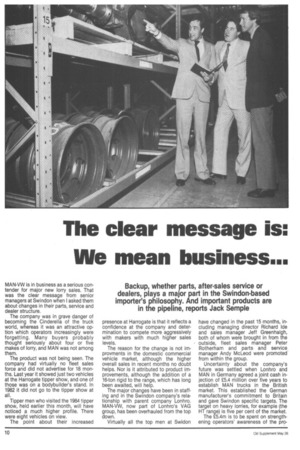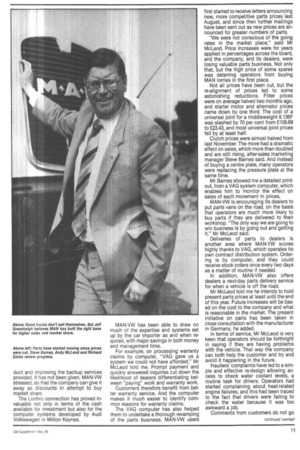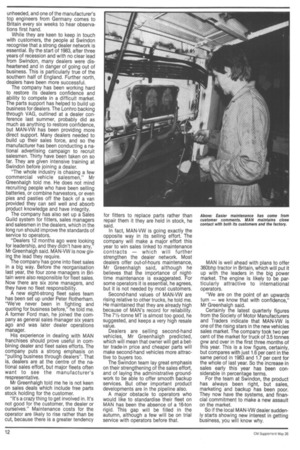The clear message is: We mean business...
Page 54

Page 55

Page 56

If you've noticed an error in this article please click here to report it so we can fix it.
MAN-VW is in business as a serious contender for major new lorry sales. That was the clear message from senior managers at Swindon when I asked them about changes in their parts, service and dealer structure.
The company was in grave danger of becoming the Cinderella of the truck world, whereas it was an attractive option which operators increasingly were forgetting. Many buyers probably thought seriously about four or five makes of lorry, and MAN was not among them.
The product was not being seen. The company had virtually no fleet sales force and did not advertise for 18 months. Last year it showed just two vehicles at the Harrogate tipper show, and one of those was on a bodybuilder's stand. In 1982 it did not go to the tipper show at all.
Tipper men who visited the 1984 tipper show, held earlier this month, will have noticed a much higher profile. There were eight vehicles on view.
The point about their increased presence at Harrogate is that it reflects a confidence at the company and determination to compete more aggressively with makers with much higher sales levels.
The reason for the change is not improvments in the domestic commercial vehicle market, although the higher overall sales in recent months no doubt helps. Nor is it attributed to product improvements, although the addition of a 16-ton rigid to the range, which has long been awaited, will help.
The major changes have been in staffing and in the Swindon company's relationship with parent company Lonhro. MAN-VW, now part of Lonhro's VAG group, has been overhauled from the top down.
Virtually all the top men at Swidon have changed in the past 15 months, including managing director Richard Ide and sales manager Jeff Greenhaigh, both of whom were brought in from the outside, fleet sales manager Peter Rotherham and parts and service. manager Andy McLeod were promoted from within the group.
Uncertainty about the company's future was settled when Lonhro and MAN in Germany agreed a joint cash injection of E5.4 million over five years to establish MAN trucks in the British market. This established the German manufacturer's commitment to Britain and gave Swindon specific targets. The target on heavy lorries, for example (the HT range) is five per cent of the market.
The £5.4m is to be spent on strengthening operators' awareness of the pro duct and improving the backup services provided. It has not been given, MAN-VW stressed, so that the company can give it away as discounts in attempt to buy market share.
The Lonhro connection has proved invaluable not only in terms of the cash available for investment but also for the computer systems developed by Audi Volkswagen in Milton Keynes. MAN-VW has been able to draw on much of the expertise and systems set up by the car importer as and when required, with major savings in both money and management time. For example, on processing warranty claims by computer, "VAG gave us a system we could not have afforded," Mr McLeod told me. Prompt payment and quickly answered inquiries cut down the likelihood of dealers differentiating between "paying" work and warranty work. Customers therefore benefit from better warranty service. And the computer makes it much easier to identify common reasons for warranty claims.
The VAG computer has also helped them to undertake a thorough revamping of the parts business. MAN-VW users first started to receive letters announcing new, more competitive parts prices last August, and since then further mailings have been sent out as new prices are announced for greater numbers of parts.
"We were not conscious of the going rates in the market place," said Mr McLeod. Price increases were for years applied in percentages across the board, and the company, and its dealers, were losing valuable parts business. Not only that, but the high price of some spares was deterring operators from buying MAN lorries in the first place.
Not all prices have been cut, but the re-alignment of prices led to some astonishing reductions. Filter prices were on average halved two months ago, and starter motor and alternator prices came down by one third. The cost of a universal joint for a middleweight 9.136F was slashed by 70 per cent from £109.69 to £23.43, and most universal joint prices fell by at least half. Clutch prices were almost halved from last November. The move had a dramatic effect on sales, which more than doubled and are still rising, after-sales marketing manager Steve Barnes said. And instead of buying a centre plate, many operators were replacing the pressure plate at the same time.
Mr Barnes showed me a detailed printout, from a VAG system computer, which enables him to monitor the effect on sales of each movement in prices.
MAN-VW is encouraging its dealers to put parts vans on the road, on the basis that operators are much more likely to buy parts if they are delivered to their workshop. "The only way we are going to win business is by going out and getting it," Mr McLeod said.
Deliveries of parts to dealers is another area where MAN-VW scores highly thanks to VAG, which operates its own contract distribution system. Ordering is by computer, and they could receive stock orders once every two days as a matter of routine if needed.
in addition, MAN-VW also offers dealers a next-day parts delivery service for when a vehicle is off the road.
Mr McLeod told me he intends to hold present parts prices at least until the end of this year. Future increases will be bas ed on the cost to the company and what is reasonable in the market. The present initiative on parts has been taken in close consultation with the manufacturer in Germany, he added. In terms of service, Mr McLeod is very keen that operators should be forthright in saying if they are having problems with the vehicle. That way the company can both help the customer and try and avoid it happening in the future.
Hauliers' complaints have led to a simple and effective re-design allowing ac cess to check water coolant levels, a routine task for drivers. Operators had started complaining about heat-related engine failures, and this had been traced to the fact that drivers were failing to check the water because it was too awkward a job.
Comments from customers do not go unheeded, and one of the manufacturer's top engineers from Germany comes to Britain every six weeks to hear observations first hand.
While they are keen to keep in touch with customers, the people at Swindon recognise that a strong dealer network is essential. By the start of 1983, after three years of recession and with no clear lead from Swindon, many dealers were disheartened and in danger of going out of business. This is particularly true of the southern half of England. Further north, dealers have been more successful.
The company has been working hard to restore its dealers confidence and ability to compete in a difficult market. The parts support has helped to build up business for dealers. The Lonhro backing through VAG, outlined at a dealer conference last summer, probably did as much as anything to restore confidence, but MAN-VW has been providing more direct support. Many dealers needed to build up their sales force, and so the manufacturer has been conducting a national advertising campaign to recruit salesmen. Thirty have been taken on so far. They are given intensive training at Swindon before joining a dealer.
"The whole industry is chasing a few commercial vehicle salesmen," Mr Greenhalgh told me. He does not mind recruiting people who have been selling batteries, or combine harvestors, or even pies and pasties off the back of a van provided they can sell well and absorb product knowledge and have integrity.
The company has also set up a Sales Guild system for fitters, sales managers and salesmen in the dealers, which in the long run should improve the standards of service to operators.
"Dealers 12 months ago were looking for leadership, and they didn't have any," Mr Greenhalgh said. MAN-VW is now giving the lead they require.
The company has gone into fleet sales in a big way. Before the reorganisation last year, the four zone managers in Britain were also responsible for fleet sales. Now there are six zone managers, and they have no fleet responsibility.
A new eight-strong fleet sales team has been set up under Peter Rotherham. "We've never been in fighting and quoting for business before," he told me. A former Ford man, he joined the company as general sales manager six years ago and was later dealer operations manager.
His experience in dealing with MAN franchises should prove useful in combining dealer and fleet sales efforts. The company puts a strong emphasis on "pulling business through dealers". That is, dealers are at the centre of the national sales effort, but major fleets often want to see the manufacturer's respresentative.
Mr Greenhalgh told me he is not keen on sales deals which include free parts stock holding for the customer.
"It's a crazy thing to get involved in. It's not good for the customer, the dealer or ourselves." Maintenance costs for the operator are likely to rise rather than be cut, because there is a greater tendency for fitters to replace parts rather than repair them it they are held in stock, he said.
In fact, MAN-VW is going exactly the opposite way in its selling effort. The company will make a major effort this year to win sales linked to maintenance contracts — which will further strengthen the dealer network. Most dealers offer out-of-hours maintenance, Mr Greenhalgh said, although he believes that the importance of nighttime maintenance is exaggerated. For some operators it is essential, he agrees, but it is not needed by most customers.
Second-hand values of MAN-VW are rising relative to other trucks, he told me. He maintained that they are already high because of MAN's record for reliability. The 71/2-tonne MT is almost too good, he suggested, and keeps a very high resale value.
Dealers are selling second-hand vehicles, Mr Greenhalgh predicted, which will mean that owner will get a better trade-in price and cheaper parts will make second-hand vehicles more attractive to buyers too.
The Swindon team lay great emphasis on their strengthening of the sales effort, and of laying the administrative groundwork to be able to offer smooth backup services. But other important product developments are in the pipeline also.
A major obstacle to operators who would like to standardise their fleet on MAN has been the absence of a 16-ton rigid. This gap will be filled in the autumn, although a few will be on trial service with operators before that. MAN is well ahead with plans to offer 360bhp tractor in Britain, which will put it up with the leaders in the big power market. The engine is likely to be particularly attractive to international operators.
"We are on the point of an upwards turn — we know that with confidence," Mr Greenhalgh said.
Certainly the latest quarterly figures from the Society of Motor Manufacturers and Traders indicate that MAN-VW is one of the rising stars in the new vehicles sales market. The company took two per cent of the market for truck of 3.5 tonnes gvw and over in the first three months of this year. This is a low figure, certainly, but compares with just 1.6 per cent in the same period in 1983 and 1.7 per cent for the whole of last year. So the increase in sales early this year has been considerable in percentage terms.
For the team at Swindon, the product has always been right, but sales, marketing and backup has been poor. They now have the systems, and financial commitment to make a new assault on the market.
So if the local MAN-VW dealer suddenly starts showing new interest in getting business, you will know why.








































































































